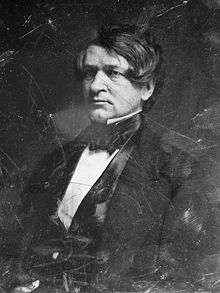William L. Dayton
William Lewis Dayton (February 17, 1807 – December 1, 1864) was an American politician, active first in the Whig Party and later in the Republican Party. In the 1856 presidential election, he became the first Republican vice-presidential nominee when nominated alongside John C. Frémont. The Republican Party lost that campaign. During the American Civil War, Dayton served as the United States Ambassador to France, a position in which he worked to prevent French recognition of the Confederacy.
William Dayton | |
|---|---|
 Dayton circa 1856 | |
| United States Minister to France | |
| In office May 19, 1861 – December 1, 1864 | |
| President | Abraham Lincoln |
| Preceded by | Charles J. Faulkner |
| Succeeded by | John Bigelow |
| 21st Attorney General of New Jersey | |
| In office January 20, 1857 – March 18, 1861 | |
| Governor | William A. Newell Charles Smith Olden |
| Preceded by | Richard Thompson |
| Succeeded by | Frederick Frelinghuysen |
| United States senator from New Jersey | |
| In office July 2, 1842 – March 3, 1851 | |
| Preceded by | Samuel L. Southard |
| Succeeded by | Robert F. Stockton |
| Personal details | |
| Born | William Lewis Dayton February 17, 1807 Basking Ridge, New Jersey, U.S. |
| Died | December 1, 1864 (aged 57) Paris, France |
| Political party | Whig (Before 1854) Republican (1854–1864) |
| Spouse(s) | Margaret Dayton |
| Education | Princeton University (BA) |
Early life
Dayton was born in Basking Ridge, New Jersey, to farmer Joel Dayton (1776–1833) and Nancy (Lewis) Dayton (1787–1866). His father worked as a farmer and mechanic, and was not well off, but the extended Dayton family was long prominent in New Jersey. William L. Dayton was the grand-nephew of Elias Dayton and second cousin of Jonathan Dayton. He graduated from the College of New Jersey (now Princeton University) in 1825. He then studied law with Peter Dumont Vroom, was admitted to the bar in 1830, and became an attorney in Freehold.
Political career
In 1837, Dayton was elected to the New Jersey Legislative Council, and he became an associate judge of the New Jersey Supreme Court in 1838. Following the death of U.S. Senator Samuel L. Southard, he was appointed to the United States Senate starting July 2, 1842, and elected to finish the term ending in 1845. He was re-elected by the New Jersey Legislature as a Whig in 1845 but lost in 1851, ending his service on March 3, 1851.
In 1856, Dayton was selected by the nascent Republican Party as their first nominee for Vice President of the United States over Abraham Lincoln at the Philadelphia Convention. He and his running mate, John C. Fremont, lost to the Democratic ticket of James Buchanan and John C. Breckinridge. Afterwards, he served as New Jersey Attorney General until 1861, when President Lincoln appointed him Minister to France. He served from May 1861 until his death in December 1864. His service spanned most of the American Civil War.
Ambassador
In France, Dayton was part of a successful lobbying campaign to prevent the government of Napoleon III from recognizing the independence of the Confederacy or allowing Confederate use of French ports.
Dayton died in Paris and was buried in Riverview Cemetery, Trenton, New Jersey.[1]
Legacy
His son, William Lewis Dayton Jr. (1839–1897), graduated from Princeton in 1858 and served as President Chester A. Arthur's Ambassador to the Netherlands from 1882–1885.
Later, the town of Dayton, New Jersey, was named in his honor.[2]
References
- James, George. "He's Looked at Life From Both Sides Now", The New York Times, "Buried here too is William Lewis Dayton, the first Republican vice presidential candidate who defeated Lincoln for the position in 1856 but lost the presidential nomination to him in 1860." February 20, 2000. Accessed December 29, 2007.
- "South Brunswick Township History". Retrieved 2012-11-09.
In 1866, the name was changed from Cross Roads to Dayton, in honor of William L. Dayton, an attorney for the Freehold and Jamesburg Agricultural Railroad. ...
Further reading
- Republican Campaign Edition for the Million. Containing the Republican Platform, the Lives of Fremont and Dayton, with Beautiful Steel Portraits of Each, 1856 (Boston: John P. Jewett), via Illinois Historical Digitization Projects of the Northern Illinois University Libraries
External links
- Biographical Dictionary of the U.S. Congress
- Photograph of William Lewis Dayton
- William L. Dayton Papers at the Princeton University Library
| U.S. Senate | ||
|---|---|---|
| Preceded by Samuel L. Southard |
U.S. Senator (Class 1) from New Jersey 1842–1851 Served alongside: Jacob W. Miller |
Succeeded by Robert F. Stockton |
| Preceded by John Leeds Kerr |
Chair of the Senate Public Buildings Committee 1842–1845 |
Succeeded by Simon Cameron |
| Party political offices | ||
| New political party | Republican nominee for Vice President of the United States 1856 |
Succeeded by Hannibal Hamlin |
| Legal offices | ||
| Preceded by Richard Thompson |
Attorney General of New Jersey 1857–1861 |
Succeeded by Frederick Frelinghuysen |
| Diplomatic posts | ||
| Preceded by Charles J. Faulkner |
United States Minister to France 1861–1864 |
Succeeded by John Bigelow |
